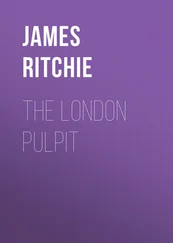James Ritchie - Here and There in London
Здесь есть возможность читать онлайн «James Ritchie - Here and There in London» — ознакомительный отрывок электронной книги совершенно бесплатно, а после прочтения отрывка купить полную версию. В некоторых случаях можно слушать аудио, скачать через торрент в формате fb2 и присутствует краткое содержание. Жанр: foreign_prose, Путешествия и география, на английском языке. Описание произведения, (предисловие) а так же отзывы посетителей доступны на портале библиотеки ЛибКат.
- Название:Here and There in London
- Автор:
- Жанр:
- Год:неизвестен
- ISBN:нет данных
- Рейтинг книги:4 / 5. Голосов: 1
-
Избранное:Добавить в избранное
- Отзывы:
-
Ваша оценка:
- 80
- 1
- 2
- 3
- 4
- 5
Here and There in London: краткое содержание, описание и аннотация
Предлагаем к чтению аннотацию, описание, краткое содержание или предисловие (зависит от того, что написал сам автор книги «Here and There in London»). Если вы не нашли необходимую информацию о книге — напишите в комментариях, мы постараемся отыскать её.
Here and There in London — читать онлайн ознакомительный отрывок
Ниже представлен текст книги, разбитый по страницам. Система сохранения места последней прочитанной страницы, позволяет с удобством читать онлайн бесплатно книгу «Here and There in London», без необходимости каждый раз заново искать на чём Вы остановились. Поставьте закладку, и сможете в любой момент перейти на страницу, на которой закончили чтение.
Интервал:
Закладка:
“Fresh fields and pastures new.”
Opposite to us is the Reporters’ Gallery. In the early days of parliament reporting was a thing much condemned. Sir Simonds d’Ewes, under the date March 5, 1641–2, gives us a special instance of this. Sir Edward Alford, member for Arundel, had been observed taking notes of a proposed declaration moved by Pym. Sir Walter Earle, member for Weymouth, upon this objected that he had seen “some at the lower end comparing their notes, and one of them had gone out.” Alford having been called back, and given up his notes to the Speaker, D’Ewes then continues: – “Sir Henry Vane, senior, sitting at that time next me, said he could remember when no man was allowed to take notes, and wished it to be now forbidden.” At present the gentlemen of the Press are taking it easy, and favouring each other with criticisms on the speakers by no means flattering. In a little while they will have to suspend their criticism and work hard enough. Above them are gilt wires, behind which we perceive the glare of silks and satins, and faintly – for otherwise attention would be drawn from the speakers below to the ladies above – but still clearly enough to make us believe —
“That we can almost think we gaze
Through golden vistas into heaven,”
we see outlines of female forms; and we wonder if the time will ever arrive when Lucretia Mott’s dream shall be realised, and woman take her seat in the senate, side by side with the tyrant man. Under the Reporters’ Gallery, and immediately facing us, sits the Speaker, in his chair of state. On his right are the Treasury Benches; on the left, those where the Opposition are condemned to sit, and fume and fret in vain. Between these benches is the table at which the clerk sits, and on which petitions, when they are received, are ordered to lie, and where are placed the green boxes, on which orators are very fond of striking, in order to give to their speeches particular force. At the end of this table commences the gangway, which is supposed to be filled with independent statesmen, and to whom, therefore, at particular times, the most passionate appeals are addressed. Lower down is the Bar of the House, where sits the sergeant-at-arms on a chair of state, with a sword by his side; but him we cannot see, as he is immediately under us. At the end of the table lies the “gilt bauble,” as Cromwell called the mace – which is the sign of the Speaker’s presence, and which is always put under the table when the Speaker leaves the chair. At one time, when a message from the Lords was announced, the Mace-bearer, bearing the mace, went to the Bar of the House, and met the Messenger, who came forward bowing, and retired in the same manner, with his face to the Speaker; for it would have been a terrible breach of etiquette had the Messenger favoured that illustrious personage with a glimpse of his back. When the Speaker leaves the chair, no one else occupies it. The House then goes into committee, and a chairman is appointed, who sits by the clerks at the table. On such occasions one of the forms of the House pertinaciously adhered to is often productive of good results. According to parliamentary rules, when the Speaker puts the motion that “I do now leave the chair,” previously to going into committee, it is at the option of any member who has a question to ask, or a statement to make, or a grievance to proclaim, to move that the House do now adjourn, and then deliver himself of whatever he may wish to say; or he can make his statement as an amendment. Such forms are very valuable, though often very inconvenient to ministers who are anxious to get over the business of the country with as much expedition as possible, and give independent members an opportunity of uttering their sentiments, of exposing jobs, of being a terror to evil rulers, and a praise to them that do well. They often lead to very animated discussions. In such little skirmishes Lord Palmerston, the Bight Hon. Benjamin Disraeli, and Mr. Thomas Duncombe greatly shine. As a rule, you may in consequence hear better debates between half-past five and eight – the time when these little scenes may be expected – than at any other period of the evening, unless, in the small hours, the House is precipitated into an Irish row.
But time has passed away, and the more serious part of the evening’s business is commenced. The benches on both sides of the House are already filled. That first row on the Speaker’s right contains the ministers. Fronting them are the Opposition, always a formidable, and generally a useful band. If the Conservatives are in office, the Right Hon. Benjamin Disraeli occupies the middle of the Treasury benches, supported on one side by the mild and respectable Sir John Pakington, and on the other by a figure fierce, and bearded, with a hook nose and a glittering eye like that of the Ancient Mariner, the great poet, novelist, and satirist of our day, Sir Bulwer Lytton. Lord Stanley, pale and studious-looking, is by; and around them are the gentle Walpole, the old party warrior, Fitzroy Kelly, and lesser lights. But undoubtedly the observed of all observers is the leader of the great Protectionist party, whose battles he has fought, whose councils he has guided, whose chiefs he has placed upon the Treasury bench. Up in the gallery no one is watched more keenly.
Lord Palmerston is the next best-stared-at man in the House; and next, that champion of the British constitution, Lord John. The Palmerstonians, whether in office or languishing on the bleak benches of opposition, are alike undistinguishable, for they have an official knack of pulling the hat over the eyebrow, so as completely to obscure the face, and from the gallery you can scarce tell one from the other, with the exception of Sir G. W. Hayter, who has always a mysterious air, and Wilson of the Economist , who rejoices in carroty, and consequently unlovely locks. On the same side of the House, but below the gangway, are the Irish ultras and tenant leaguers, a band once formidable; but Lucas dead, Duffy seeking on another arena the position denied him here, Bowyer, bearded and red-haired, little better than the mouthpiece of Ultramontanism – that small party are little feared and little courted now. Below the gangway is the balance of power, where sit, on the first bench on the floor, on the right, Roebuck and Lord John Russell; the Manchester party (for, in spite of Manchester’s ignoble denial of the same, there is still a policy known as of Manchester) are close behind. The Peelites and the eccentricities sit on the other side. Bright and Gibson represent the Gracchi. What Gladstone and Sidney Herbert and Sir James Graham represent, it is hard to say; yet in that great assembly you shall not find three abler men.
But we have been already some time in the House. Hours have come and gone – day has faded into night. Suddenly, from the painted glass ceiling above, a mellow light has streamed down upon us all. Rich velvet curtains have been drawn across the gorgeously painted windows, and if we had only good speeches to listen to, we should be very comfortable indeed. Alas, alas, there is no help for us! As soon as “Wishy” sits down, “Washy” gets up; and members thin off, leaving scarcely forty in the House. Nor can we wonder at this. Men must dine once in the twenty-four hours, and members of the House of Commons obey this universal law. Most of them have been hard at work all the day. It is no very pleasant life theirs, after all; crowded committee rooms all day, and the heated air of the House all night. An M.P. should have an iron frame as Joseph Hume had, or he cannot do his duty to his country or his constituents. Even we grow, as we sit in the gallery a few hours, weary as Mariana in the moated grange. Would that we were with the wife of our bosom at home! Would that we were listening to the child-like prattle and silver laugh of Rose! Would that we were discussing divine philosophy with a friend amidst a genial cloud of tobacco smoke! Would that we were anywhere – anywhere out of this! Sleep comes not when you want him. If you read, the gallery keeper is down on you in an instant; and as to talking, that is quite out of the question. Hark! whose is that name the speaker announces? It is that of one of the leaders. What a change has come over the House! No more chatting and laughing of members on empty benches – no more idling of reporters – no more indifference in the strangers’ gallery. Even the divine voices of the women are hushed, and they stop to pay the homage beauty should ever love to pay to intellect and strength. What a grand sound is that cheer bursting from five hundred throats – for the house is hearty in its approval of a good speech, on whatever side it be delivered; and how telling is the reply, and how vehemently cheered – on one side at least; and how chaotic the confusion, and how discordant the sounds, when one of the smaller fry attempts to continue the debate which the House evidently considers has been sufficiently discussed, and respecting which it is now anxious to come to a vote! The helpless orator’s voice is lost in the clamour. After a few minutes’ purgatory he has sense enough to sit down, the Speaker reads the question, and puts it – the ayes have it, the noes demand a division – the bell rings – peers and diplomatists and distinguished strangers under the gallery are turned out. Thanks to our insignificance we are suffered (though but recently has this been the case) to remain and see the ayes move in to the right and noes to the left. The House is emptied with the exception of the Speaker, the clerks, and the tellers. Immediately it begins to fill. After a little while all have come back. The tellers go to the bar, and thence in a row march up to the table, at which they are met by the clerk, to whom they give the result of the division. Already the House knows which side has won from the way in which the tellers are placed, the tellers of the victorious party being on the right side. And now the division is announced from the chair, the triumphant party cheer, and the House, if it be late, almost immediately adjourns. Out bound honourable M.P.’s as schoolboys out of school. Glad enough are they the thing is over; and, lighting their cigars – it is astonishing what smokers honourable gentlemen are – not unreluctantly do they go home. Following their example, we exchange the noisy and heated house for the chill and silent night. Yet, as we go, we cannot help observing, how generally well-behaved and patient the House has even been to unutterable bores. It is seldom they put a man down, or are boisterous or rude. A man of no party easily gets a hearing; but he cannot secure attention. The House is polite, not cordial – civil, but not encouraging. Accordingly the multitude, the second and third-rate men – that is, all except a dozen – do not attempt to speak to the House at all, but to the gallery, and, through the press, to their constituents. If the speeches were not reported, they would, in most cases, be made shorter and better. For instance, your own representative Smithers made a speech. The weak-minded politicians of Rottenborough class Smithers as A 1; and when he tells them what a fire-eater he is in the House, and what things he says to government, they wonder Smithers has not been committed to the Tower for high treason by the base and brutal myrmidons of power. Now, what are the actual facts? While Smithers was speaking, the House very still – and perhaps, with the exception of an understrapper of the Treasury, enjoying a five minutes’ snooze, or deep in a statistical calculation, not a soul was on the government benches at all – nobody listened to Smithers; yet, on went Smithers stuttering incoherently, reading from his notes with fearful pauses between, screaming at the top of his voice, sawing the air with his arms in the manner of the unhappy Mr. Frederick Peel, amidst universal indifference, save when occasionally a good-natured friend timidly called out, “Hear, hear.” The Speaker, perhaps, was chatting with an acquaintance about his next parliamentary levée; if Smithers had stood on his head, I almost question whether any one would have been aware of the fact; and Smithers sits down, as he rises, without any particular mark of approval at all. Why, then, does Smithers speak? Why, because the Press is there – to treasure up every word – to note down every sentence – to let the British nation see what Smithers said. This, of course, is a great temptation to Smithers to speak when there is no absolute necessity that Smithers should open his mouth at all. Yet this has its advantages – on the morrow honourable gentlemen have the whole debate before them, coolly to peruse and study; and if one grain of sense lurked in Smithers’ speech, the country gets the benefit. At times, also, were it not for the Press, it would be almost impossible to transact the business of the country. For instance, we refer to Mr. Wilson’s proposals for Customs Reform. On the occasion to which we refer, Mr. Wilson spoke for nearly four hours. Mr. Wilson we believe to be an excellent man, and father of a family, but he certainly is a very poor speaker. Never was there a duller and drearier speech. Few men could sit it out. In the gallery there were a few strong-minded females who heard every word – what cannot a strong-minded woman do? – but M.P.’s gossipped in the lobby – or dined – or smoked – or drank brandy-and-water – in short, did anything but listen to Mr. Wilson; and yet this was a grave, serious government measure. Why, then, did not members listen? Because there was no need for them to do so. The
Читать дальшеИнтервал:
Закладка:
Похожие книги на «Here and There in London»
Представляем Вашему вниманию похожие книги на «Here and There in London» списком для выбора. Мы отобрали схожую по названию и смыслу литературу в надежде предоставить читателям больше вариантов отыскать новые, интересные, ещё непрочитанные произведения.
Обсуждение, отзывы о книге «Here and There in London» и просто собственные мнения читателей. Оставьте ваши комментарии, напишите, что Вы думаете о произведении, его смысле или главных героях. Укажите что конкретно понравилось, а что нет, и почему Вы так считаете.












